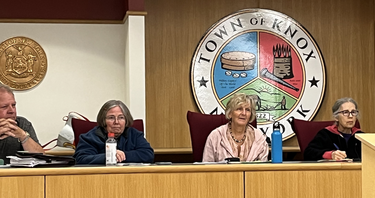Knox Planning Board firmly rejects RIC solar proposal
KNOX — After three years of vying for a 4.4-megawatt solar facility on Thompsons Lake Road, RIC Energy has failed to convince the Knox Planning Board to OK the proposal.
All five of planning board members present on July 13 voted against the project, citing the concerns of the many town residents who spoke against it at meetings, along with worries about the amount of trees that would need to be cut down and how the presence of a visible solar facility might affect the way outsiders perceive the town.
Board member Todd LaGrange, who had voted against the original proposal as well, said at the meeting that the past three-and-a-half years have taken a toll on the residents.
“It’s almost like somebody was sick in their family, and all they think about and worry about is this,” he said. “And you don’t understand how these people think, because we are different people up here. We take care of each other. We all think alike.”
LaGrange acknowledged that the town’s zoning law allows for large-scale solar facilities subject to site-plan approval, but said there’s a “right place and a wrong place.”
“I do not think this should be here,” he said.
Chairwoman Debra Nelson said it was “the most difficult position” she’s found herself in as a board member, but said the public’s reaction ultimately moved her against it.
“It went beyond not-in-my-backyard,” she said, referring to the phrase many use to describe opponents of projects like solar that are desirable in the abstract but require certain sacrifices or compromises by those they’re located near.
“There were some very compelling comments, very thoughtful comments,” she said.
Nelson also said that the RIC “did a good job listening and adjusting, but there’s just some things you can’t really [change].”
After voting, many from the crowd of more than a dozen people thanked the board.
It was a surprising development given how close the planning board had come to approving an earlier iteration of the project in 2021, when it failed because of what basically amounts to a string of terrible luck for RIC.
In the first go-around, four out of seven planning board members had voted to approve the project but, because the Albany County Planning Board had disapproved of the project — in part because it had misinterpreted county law, five members of the Knox seven-member board, a supermajority, had to vote in favor.
That fifth vote would have come from Nelson, who became suddenly absent from the remote meeting just before her vote due to what she later explained was a family emergency. Nelson had earlier cast a vote for conditional approval of that project, but would not say how she intended to vote that night.
RIC resubmitted the proposal again earlier this year, pitching it as an improved version of the old project that took into account the various criticisms it had heard from the community.
It managed to convince enough of the county planning board members to not need a supermajority vote from the town; however, the county did not officially approve or disapprove of the project because the five-member county board was left with a tied vote , 2 to 2, since a fifth member who was present earlier in the meeting had to leave before the RIC vote.
Al Gaige, a Knox resident who has strongly opposed the project from the beginning, in part because of the impact he felt noise from the facility would have on his daughter, who has cerebral palsy and a highly sensitive startle reflex, told The Enterprise after the vote that he hadn’t expected this outcome.
He said that the difference this time around may have been that, with COVID-19 restrictions no longer in place, the board now had to see the community face-to-face instead of over a screen or through correspondence.
RIC’s Head of Environmental Affairs and Permitting, Kevin Bliss, seemed gracious toward the board following the vote, telling board members that he felt they were thoughtful throughout the process.
“You have the responsibility to do what the town needs, and you thought about it, so I’ll respect that,” he said. “I’m not going to go away mad; I’ll just go away.”
Although Nelson had told an audience member who asked if RIC could resubmit the same proposal that, after the year-long moratorium on solar projects that the town recently adopted ends, RIC technically could, Bliss said that the company gets “the message loud and clear that what we proposed at the place was not a good idea.”
Several residents had asked the board why the town doesn’t forbid large-scale solar facilities in certain districts. Nelson responded that the purpose of the moratorium is for officials to look at the current zoning law and make adjustments, and that community input would be welcome.
The zoning currently allows for large-scale solar facilities in all areas except the two relatively small land-conservation districts. However, it’s conditional on site-plan approval, which is what RIC failed to obtain this week.
Nelson pointed out that the board had approved another RIC project in the town because its location was away from residences and out of sight from the road, despite being in a residential district.
She said that it’s “not the district, per se,” but the compatibility with the land and people surrounding a project.
It’s not clear when the moratorium officially began since the law takes effect only once the paperwork has been submitted to the New York State Department of State. The Enterprise is awaiting response to a Freedom of Information Law Request to the department for that information, since Nelson said at the meeting she was unsure what the official date was.
Absences
The planning board also voted — 4-to-0, with Ed Ackroyd abstaining — to authorize Nelson to bring up the persistent absences of two planning board members, Kurt Johnson and Bill Pasquini, to the town board so that they may be removed for cause and replaced with new members.
“It’s not fair to … the community, it’s not fair to us, it’s not fair to an outside vendor coming into town wanting to do business that we don’t have people to do business with,” LaGrange said.
In addition to this month’s meeting, Johnson was absent from the June and May meetings this year, according to meeting minutes, while Pasquini was absent from the June, May, March, and February meetings.
Johnson and Pasquini could not immediately be reached.
In 2018, the Knox Town Board passed a law in a split vote — with the two Democrats voting against it and the three Republicans voting for it — stipulating that, if appointees miss two meetings in a year, they would be dismissed.
The Knox Planning Board is also missing another member after former Chairman Tom Wolfe stepped down from the board. Nelson said that he will be replaced by Zach Martineau, who will start in August.


